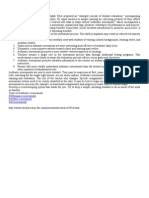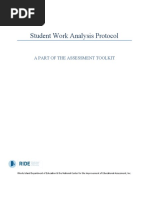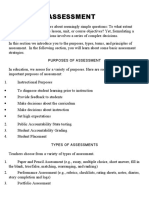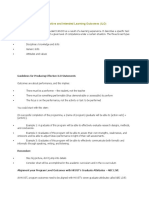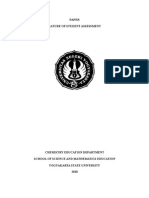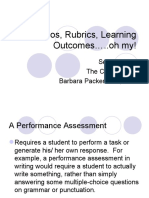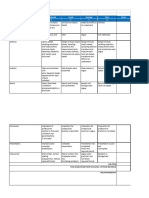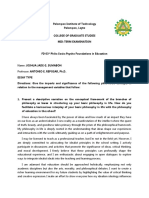Performance Tasks EduChange
Performance Tasks EduChange
Uploaded by
Gamachis GabisaCopyright:
Available Formats
Performance Tasks EduChange
Performance Tasks EduChange
Uploaded by
Gamachis GabisaCopyright
Available Formats
Share this document
Did you find this document useful?
Is this content inappropriate?
Copyright:
Available Formats
Performance Tasks EduChange
Performance Tasks EduChange
Uploaded by
Gamachis GabisaCopyright:
Available Formats
Performance Tasks:
Characteristics and Possibilities
This primer offers characteristics of a performance task, offers ideas about different types of
tasks, and provides a link to example tasks for further perusal.
Performance Tasks vs. Predictable Tasks
For many years, teachers have designed assessments for which certain students could virtually
assure their success. Students who study tend to do well on these assessments. However, even
those students who do not possess all lecture notes, may not have completed all homework
assignments, and may not have participated in class discussions could perform well too. Why?
Teachers may say it is because those students are merely “good at taking tests.” Students who
are successful on traditional tests and exams are actually good at:
memorizing pertinent facts (in the language used by the teacher)
internalizing the way the teacher structures content and questions, and perhaps
predicting the question types the teacher will use.
In sum, students who are good at predictable tasks tend to do well on the types of tests where
“studying” is useful. Studying is merely code for mimicking the idiom of the teacher’s own
presentation.
If students respond to a recall-based assessment item, such as a multiple choice or fill-in-the-
blank question, there is a correct answer that a rater can determine simply by looking at the
answer key. In a situation where students must produce a more complex response, either in one
sitting or perhaps over an extended period of time, some response variety is expected. In this
situation, we need a more descriptive and even multi-faceted instrument to assess the work
product. These types of assignments, prompts and questions are sometimes referred to as
performance tasks. Where the work product is more involved, the task tends to be described in
more depth as well (though not always).
A single, common definition of the performance task is elusive, however we propose the following
for consideration:
Students do not already know, and
cannot easily predict, the outcome of a
performance task prior to the
commencement of the task.
Indeed, the teacher may not be fully
aware of all of the possible outcomes.
©2013 EduChange, Inc. Page 1
General Characteristics of Performance Tasks
At this juncture in assessment history, the performance task is receiving particular attention from
policy makers vis-à-vis national and international standardized exam development. The Common
Core State Standards, for example, will be assessed in part using performance tasks that are
currently under development.1 While many standardized state and national tests have included
performance tasks in the past, some feel that their ability to uncover a richer picture of student
learning than traditional, single-correct-response items has not yet been optimized in this arena.
The jury is still out on the Common Core Assessments; it is not clear whether the data generated
from these tests will shed significantly more light on student learning. In many ways, classroom
teachers have a better chance of designing performance tasks that will support their
understanding of student learning and progress.
Figure 1: General Characteristics of Performance Tasks
Performance Tasks:
include any type of assessment of student learning except those where a single
correct answer is required (e.g., multiple choice, matching, etc.);
may require students to demonstrate depth and sophistication within a narrow band
of concepts and skills;
may require students to demonstrate the synthesis and integration of different sets of
concepts and skills;
are judged on the basis of descriptive performance criteria designated by teachers,
assessment designers, students, or a combination of these players; and
typically are assessed using rubrics.
Figure 1 offers a general set of characteristics that may be useful when describing performance
tasks. The prior section unpacked the nature of the first bullet point. The remaining bullet points
demonstrate intrinsic relationships to both curriculum and instruction.
Depth and Sophistication: The Lonely Criteria
The obvious reason why teachers tend not to assess for depth and sophistication is that they do
not teach for it. The pressure to “cover” curriculum in superficial ways prompts many teachers to
believe they are not doing their jobs properly if they do not attend to every learning objective,
standard or textbook chapter designated for their course. The dirty little secret is that the vast
majority of teachers don’t cover what they intend to anyhow. Nonetheless, the list of topics and
sub-topics defining a course tends to be about the only clear aspect of a teacher’s job description
1New York participates in the PARCC consortium, one of two groups of states tasked with designing
assessments based on the Common Core State Standards. Current information about assessment
development and deployment may be found at http://www.parcconline.org/about-parcc
©2013 EduChange, Inc. Page 2
as far as curriculum is concerned. Teachers understandably attend to that which is concretely
defined for them, and view curriculum coverage as their primary duty.
Some administrators understand that curricular or standards coverage is not sufficient, and
possibly not necessary, for student learning. Curricular coverage may not reap any gains in
student achievement (the jury is still out). Administrators may plead with teachers to abandon the
textbook and “go deeper” with certain topics or issues in order to engage and excite students.
Teachers blame a lack of time for their inability to heed this request—but it is not the conceptual
knowledge alone that presents challenges. A less obvious reason why teachers tend not to teach
or assess for depth and sophistication is student deficits in critical thinking and other academic
skills.
In order to treat a topic more deeply, we must teach students how to utilize a variety of skills and
give them time to practice. Performance tasks that require the demonstration of these forgotten
or assumed skills make this type of performance task quite lonely. Skills related to critical reading
in the subject area, discussion & active listening, experimental design, solution design,
information procurement (research), information management, academic writing, collaboration,
time management, and the use of productivity software are all skills that could be required in order
to tackle an in-depth or advanced task.
With careful planning, teachers can identify a narrow band of skills that are most pertinent to an
in-depth study and can prepare students by giving them time to practice them alongside
conceptual learning. With a more singular focus, the necessary skills may be identified more
easily.
Examples of performance tasks that require depth and sophistication include:
Author studies, where students compare several works of a single author
Biographical studies, where students explore decisions and ideas that led an individual
to success, failure, fame, infamy, fortune or destitution—or simply formed his/her life
journey
Genre studies, where students pick a single genre and compare several works across
time, cultures or perspectives
Data set queries, where students explore a single large or rich data set from a variety of
angles and perspectives
Longitudinal experiments, where students design and execute a long-term experiment
requiring several data collection episodes and different modes of analysis
Design challenges, where students design, test and redesign a solution to a problem
Multiple-variation challenges, where students propose different variations on a theme
(e.g., poetry, fine arts, culinary arts) or multiple solutions to the same problem (e.g.
math, physics, engineering, economics, political science)
Sadly, even students in upper-level, honors, or advanced courses do not possess these critical
thinking and academic skills, despite pleas from university professors, government, and industry.
©2013 EduChange, Inc. Page 3
Teachers of these courses tend not to devote classroom time to teaching them. This may not be
entirely their fault.
Even when end-of-course exams that rely mostly on predictable tasks are not required, school
communities demand that courses end in a purchasable standardized test whose tasks are largely
predictable (SAT II, IB, AP, Cambridge, etc.). The test designers have made sure that many
administrators, teachers, parents and students believe that a standardized test validates student
learning and quality teaching. This sentiment, of course, invites the marketplace to design more
predictable tests and make more money. While there is expertise available to design standardized
tests that are performance-based, these are quite costly and decrease profit margins.
Synthesis and Integration
Performance tasks that require a variety of skills and concepts, but may not require particularly
sophisticated demonstrations of any one skill or concept, tend to fall into this category. These
types of performance tasks work well after multiple topics, chapters and skills have been taught
and practiced over a period of time. Some refer to this as a systems thinking approach. Without
a coherent program of studies that tracks skills and concepts horizontally and vertically,
performance tasks that require an accumulation of knowledge and skills sets cannot be designed
with fairness. This design flaw leads us to miss opportunities to celebrate powerful synthetic and
integrated student learning.
With careful planning, teachers can identify global and local issues that require students to weigh
multiple perspectives and integrate concepts across disciplines. This is the work of policymakers,
corporate executives, national leaders, scientists and filmmakers. With a broader focus, we invite
students to decide which skills and concepts are most important to deploy in a given situation.
Examples of performance tasks that require synthesis and integration include:
Determining an unknown, where students use a variety of techniques and concepts to
solve a mystery, determine the identify of
an unknown substance, or classify a
newly-discovered species
Without a coherent
program of studies that
Case studies, where students immerse in
a real or fictitious event to examine tracks skills and concepts
implications or outcomes
horizontally and vertically,
Real-time role plays, where students
respond to a posed issue or problem in performance tasks that
real time as a character or themselves
require an accumulation of
Town hall meeting, where students must
address different perspectives on an issue knowledge and skills sets
in order to make a decision that is cost-
effective, just and ethical cannot be designed with
Interdisciplinary portfolio development, fairness.
where students collect their own work
over an extended period and analyze a
variety of features to determine strengths and weaknesses within and across disciplines
©2013 EduChange, Inc. Page 4
Descriptive Performance Criteria
In order to assess student performance, criteria must be defined and shared. In some cases it is
enough to say, “I know you have met the criteria if your bridge successfully carries the required
load without collapsing.” However, most teachers feel that other parts of the journey, not merely
the outcome, are worth assessing. In these cases we can use descriptive criteria to help students
understand what we mean by success on a performance task. To be truly descriptive, it is helpful
to articulate a continuum of quality so students understand the difference between “excellent” and
“not so great.” Students want to know this, and often cannot determine the difference without help.
With performance tasks, where outcomes are unpredictable, it is not only supportive but
necessary for the teacher to describe clearly the assessment criteria at every level of
performance. In this way, teachers communicate to students how much the outcome itself matters
(i.e., “Did you solve the problem?) relative to the demonstration of pertinent skills and knowledge
along the way.
For further explanations of rubrics that may be used to assess performance tasks, consult the
Rubric as Text primer that is part of this series.
A nice introduction to performance tasks from well-regarded organizations:
http://pals.sri.com/tasks/index.html
©2013 EduChange, Inc. Page 5
You might also like
- Lesson 1 The Field of Forensic Document Examination100% (1)Lesson 1 The Field of Forensic Document Examination14 pages
- Jeffrey V. Castro Bsed-Fs1&2 Instructor: Mrs. Pamela C. CarbonelNo ratings yetJeffrey V. Castro Bsed-Fs1&2 Instructor: Mrs. Pamela C. Carbonel6 pages
- Janet Alleman - Authentic Assessment in Social StudiesNo ratings yetJanet Alleman - Authentic Assessment in Social Studies20 pages
- Oldani Student Work Analysis Protocol FormNo ratings yetOldani Student Work Analysis Protocol Form8 pages
- Alternatives To Selected-Response AssessmentNo ratings yetAlternatives To Selected-Response Assessment2 pages
- What Does Research Say About AssessmentNo ratings yetWhat Does Research Say About Assessment20 pages
- Assessment and Evaluation in Mathematics Prelim100% (3)Assessment and Evaluation in Mathematics Prelim19 pages
- What Is The Difference Between Formative and Summative Assessment? Formative AssessmentNo ratings yetWhat Is The Difference Between Formative and Summative Assessment? Formative Assessment17 pages
- 2012 School-Assessed Coursework: Unit 3 General CommentsNo ratings yet2012 School-Assessed Coursework: Unit 3 General Comments10 pages
- Educ 11 Report (Performance-Based Tests)No ratings yetEduc 11 Report (Performance-Based Tests)4 pages
- Seven Practices For Effective Learning: Buy This IssueNo ratings yetSeven Practices For Effective Learning: Buy This Issue7 pages
- Assessment of Learning 1 Arnold B. Salazar MODULE 2, Lesson 2No ratings yetAssessment of Learning 1 Arnold B. Salazar MODULE 2, Lesson 212 pages
- Analyse Theories Principles and Models oNo ratings yetAnalyse Theories Principles and Models o5 pages
- Defining Curriculum Objective and Intended Learning OutcomesNo ratings yetDefining Curriculum Objective and Intended Learning Outcomes9 pages
- Pre-Assessment or Diagnostic AssessmentNo ratings yetPre-Assessment or Diagnostic Assessment12 pages
- Portfolios, Rubrics, Learning Outcomes ..Oh My!: Session Five The Cordon Bleu Barbara Packer-Muti, EddNo ratings yetPortfolios, Rubrics, Learning Outcomes ..Oh My!: Session Five The Cordon Bleu Barbara Packer-Muti, Edd30 pages
- How to Practice Before Exams: A Comprehensive Guide to Mastering Study Techniques, Time Management, and Stress Relief for Exam SuccessFrom EverandHow to Practice Before Exams: A Comprehensive Guide to Mastering Study Techniques, Time Management, and Stress Relief for Exam SuccessNo ratings yet
- CST Students with Disabilities: New York State Teacher CertificationFrom EverandCST Students with Disabilities: New York State Teacher Certification5/5 (1)
- FD 03 Midterm Exam - Joshua Jade G. Sumabon, LPTNo ratings yetFD 03 Midterm Exam - Joshua Jade G. Sumabon, LPT5 pages
- JW Peperiksaan Akhir Sem Ke 2 j12s12 2024 Print-1No ratings yetJW Peperiksaan Akhir Sem Ke 2 j12s12 2024 Print-13 pages
- Paper 6 Introduction To Archaeology English VersionNo ratings yetPaper 6 Introduction To Archaeology English Version171 pages
- Pengaruh Pemberian Kuis Terhadap Motivasi Dan Hasil Belajar Siswa Sma Swasta Pembda 1 Gunungsitoli Tahun Pelajaran 2017/2018No ratings yetPengaruh Pemberian Kuis Terhadap Motivasi Dan Hasil Belajar Siswa Sma Swasta Pembda 1 Gunungsitoli Tahun Pelajaran 2017/20186 pages
- Information Theory, IT Entropy Mutual Information Use in NLPNo ratings yetInformation Theory, IT Entropy Mutual Information Use in NLP23 pages
- Quarter 2 Lesson 7the Human Person in SocietyNo ratings yetQuarter 2 Lesson 7the Human Person in Society42 pages
- Students' Lack of Interest, Motivation in Learning, and Classroom Participation: How To Motivate ThemNo ratings yetStudents' Lack of Interest, Motivation in Learning, and Classroom Participation: How To Motivate Them11 pages
- Emotional Abuse Among In-School Adolescents in Ekiti State, NigeriaNo ratings yetEmotional Abuse Among In-School Adolescents in Ekiti State, Nigeria7 pages
- Research Problem: Five Factors To Consider To Find Out If A Problem Is ResearchableNo ratings yetResearch Problem: Five Factors To Consider To Find Out If A Problem Is Researchable3 pages
- Classroom Management Practices of Teachers and Academic Performance of Grade 3 Learners Across All Learning AreasNo ratings yetClassroom Management Practices of Teachers and Academic Performance of Grade 3 Learners Across All Learning Areas10 pages
- Lesson 1 The Field of Forensic Document ExaminationLesson 1 The Field of Forensic Document Examination
- Jeffrey V. Castro Bsed-Fs1&2 Instructor: Mrs. Pamela C. CarbonelJeffrey V. Castro Bsed-Fs1&2 Instructor: Mrs. Pamela C. Carbonel
- Janet Alleman - Authentic Assessment in Social StudiesJanet Alleman - Authentic Assessment in Social Studies
- What Is The Difference Between Formative and Summative Assessment? Formative AssessmentWhat Is The Difference Between Formative and Summative Assessment? Formative Assessment
- 2012 School-Assessed Coursework: Unit 3 General Comments2012 School-Assessed Coursework: Unit 3 General Comments
- Seven Practices For Effective Learning: Buy This IssueSeven Practices For Effective Learning: Buy This Issue
- Assessment of Learning 1 Arnold B. Salazar MODULE 2, Lesson 2Assessment of Learning 1 Arnold B. Salazar MODULE 2, Lesson 2
- Defining Curriculum Objective and Intended Learning OutcomesDefining Curriculum Objective and Intended Learning Outcomes
- Portfolios, Rubrics, Learning Outcomes ..Oh My!: Session Five The Cordon Bleu Barbara Packer-Muti, EddPortfolios, Rubrics, Learning Outcomes ..Oh My!: Session Five The Cordon Bleu Barbara Packer-Muti, Edd
- How to Practice Before Exams: A Comprehensive Guide to Mastering Study Techniques, Time Management, and Stress Relief for Exam SuccessFrom EverandHow to Practice Before Exams: A Comprehensive Guide to Mastering Study Techniques, Time Management, and Stress Relief for Exam Success
- CST Students with Disabilities: New York State Teacher CertificationFrom EverandCST Students with Disabilities: New York State Teacher Certification
- Paper 6 Introduction To Archaeology English VersionPaper 6 Introduction To Archaeology English Version
- Pengaruh Pemberian Kuis Terhadap Motivasi Dan Hasil Belajar Siswa Sma Swasta Pembda 1 Gunungsitoli Tahun Pelajaran 2017/2018Pengaruh Pemberian Kuis Terhadap Motivasi Dan Hasil Belajar Siswa Sma Swasta Pembda 1 Gunungsitoli Tahun Pelajaran 2017/2018
- Information Theory, IT Entropy Mutual Information Use in NLPInformation Theory, IT Entropy Mutual Information Use in NLP
- Students' Lack of Interest, Motivation in Learning, and Classroom Participation: How To Motivate ThemStudents' Lack of Interest, Motivation in Learning, and Classroom Participation: How To Motivate Them
- Emotional Abuse Among In-School Adolescents in Ekiti State, NigeriaEmotional Abuse Among In-School Adolescents in Ekiti State, Nigeria
- Research Problem: Five Factors To Consider To Find Out If A Problem Is ResearchableResearch Problem: Five Factors To Consider To Find Out If A Problem Is Researchable
- Classroom Management Practices of Teachers and Academic Performance of Grade 3 Learners Across All Learning AreasClassroom Management Practices of Teachers and Academic Performance of Grade 3 Learners Across All Learning Areas






















